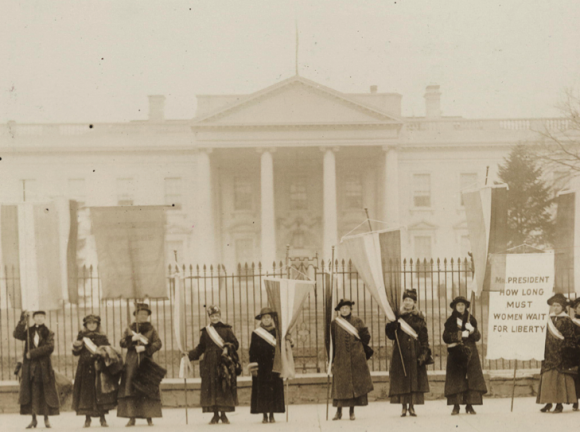
Celebrating a Historic Milestone
August 14, 2020
“The right of citizens of the United States to vote shall not be denied or abridged by the United States or by any state on account of sex.”
One-hundred years ago, women from around the country fought, picketed, and were imprisoned to secure their constitutional right to vote. The 19th Amendment to the U.S. Constitution removed sex as a reason for denying anyone the right to vote. On August 18, 1920, Tennessee became the 36th and final state needed to ratify the amendment. However, the amendment did not actually grant all women this right.
Women of color – Native American, Asian American, Latinx and African American – had played an active role in the struggle for the 19th Amendment, participating in marches, political meetings and organizing events. But racism plagued these women’s participation in the suffragist movement according to Chapman History Professor, Charissa Threat. During the famous 1913 suffrage parade in Washington D.C., for example, organizers wanted Black suffragists to march at the end of the parade but Ida B. Wells famously refused and joined her state group in the middle of the parade. Additionally, women of color, like African American activist Mary Church Terrell, had to often remind white female suffragists that excluding black women from the vote was the same as excluding them because of their sex, according to Threat. Therefore, even after the 19th Amendment was ratified, these groups of women continued fighting to secure their own voting rights for many years.
The federal suffrage amendment prohibited discrimination on sex, but it didn’t say anything about race. In 1868, the 14th Amendment granted citizenship to recently freed slaves, followed in 1870 by the 15th Amendment that prohibited denying the right to vote “on account of race, color, or previous condition of servitude.” Racially discriminatory laws, however, prevented African American men and women from voting throughout the south for much of the twentieth century through mechanisms such as poll taxes and literacy tests. Intimidation and violence also suppressed voting by African Americans. Forty-five years after the 19th Amendment, with the 1964 ratification of the 24th Amendment, which banned poll taxes and the passage of the Voting Rights Act of 1965, African American women and men received federal protection for their right to vote.
In 1924, with the passage of the Snyder Act, American-born Native women gained citizenship, and the right to vote.
Asian-born immigrants were prevented from becoming naturalized citizens until 1952 when the Immigration and Nationality Act made naturalization, and the right to vote, possible. In 1975, a revised Voting Rights Act, banned discrimination against non-English speakers, opening up voting to citizens who spoke other world languages.
It was a long battle for all these women, to fight and make a difference in our country, paving the way for Senator Kamala Harris becoming the first woman of color and first Asian-American vice-presidential candidate.
Want to learn more about women and gender inequality?
Wilkinson College offers a Women’s Studies Minor which provides an overview of the interdisciplinary approaches to the study of women and gender inequality; cultural representations of women and their social roles; and the social axes of gender, race, class and sexuality. The minor provides students with a broad, interdisciplinary framework for analyzing social practices related to gender as well as the impact on their own lives.
“The centennial of the ratification of women’s suffrage in this year of 2020 offers us a valuable learning opportunity. From a deeper understanding of the 19th Amendment—its passage, context, and consequences— we can gain insight into the complexities of socio-political struggle and the relevancy of its lessons to today’s,” said Professor CK Magliola, director of the Women’s Studies Program. For more information about the women’s studies minor program, please email Professor CK Magliola.
Sources: history.com, pbs.org, americanbar.org, LBJ Library, Library of Congress


